NFDI4Objects Community Meeting 2025
30.09. to 02.10.2025 at the German Mining-Museum Bochum
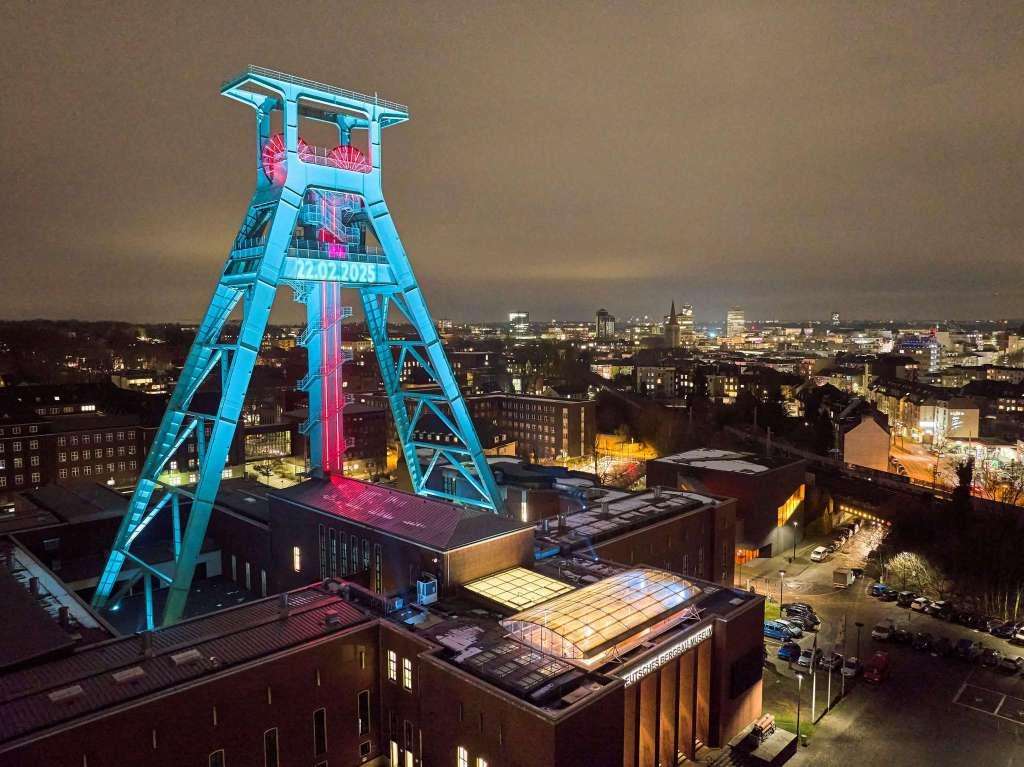
Photo: Hauke Dressler/ German Mining-Museum Bochum
The third community meeting of NFDI4Objects will take place from 30 September to 2 October 2025 at the German Mining-Museum in Bochum. The meeting will provide an opportunity to discuss progress and challenges in the consortium and to network with members of the community. You can register for the Community Meeting via the following link . We look forward to your participation!
A look back to our Community Meeting

Group picture in front of the German Mining-Museum © Fliegender Fotograf 01.10.2025
This was the 3rd Community Meeting of NFDI4Objects in Bochum:
The 3rd Community Meeting of NFDI4Objects took place this year from 30 September to 2 October at the German Mining Museum in Bochum with a total of 122 participants. This year’s three-day conference once again proved its worth as a place for communication, strategic planning and FAIRification of object-related data in the field of research data management (RDM). In particular, challenges and progress made by the consortium were discussed this year.
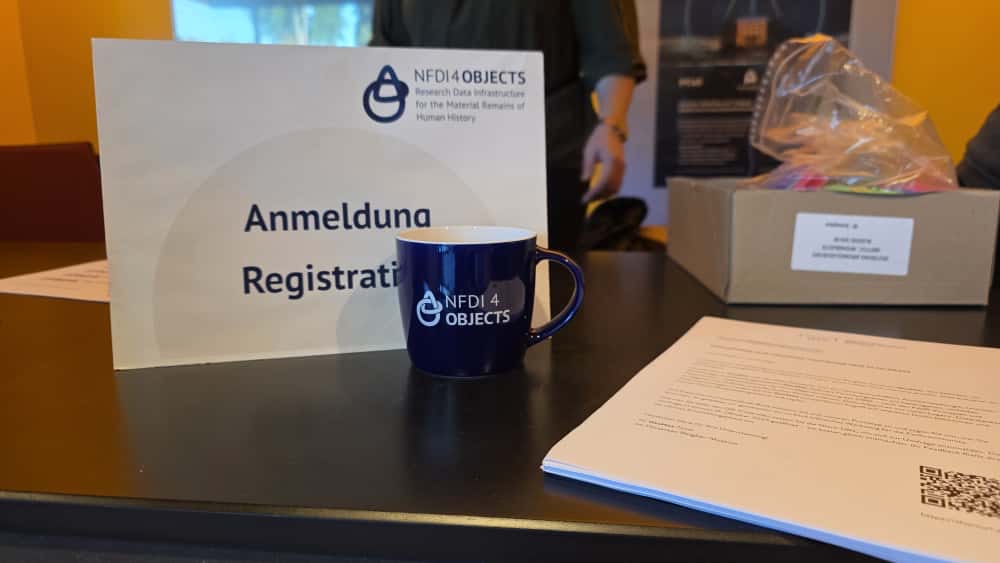
Registration © 30.09.2025 Anja Gerber
Day 1, Tuesday 30.09.2025
After registering in the ‘Black Diamond’, an extension to the German Mining-Museum, the conference participants were able to take part in the first workshops. A total of seven workshops on various topics of the consortium were held at the German Mining-Museum, the House of Archaeology at the Ruhr University Bochum and the Georg Agricola University of Applied Sciences.
Workshop 1 - What can a knowledge graph do? Data validation, enrichment, import and analysis, application
Workshop 1 focussed on the knowledge graph developed by NFDI4Objects and a ‘hands-on’ session on its use. Fabian Fricke from the German Archaeological Institute, Florian Thiery from LEIZA as well as Josef Heers, Gerald Steilen and Jakob Voß from the GBV’s Network Centre explained how the Knowledge Graph works using the Samian Research Base and Linked Open Ogham collections. This includes preparing data so that it can be uploaded. R and Python can then be used to carry out statistical analyses of large amounts of data that could no longer be handled manually. Institutions also have the option of feeding their own collections into the graph in order to use them for research questions and contexts. As the number of participants was limited and there was already great interest in the first slot, a second workshop on the topic of the Knowledge Graph was held on Thursday 2 October.

Workshop Knowledge Graph © Fliegender Fotograf 30.09.2025
Workshop 2 - GIS-centred workflows in archaeological (excavation) practice: From the survey file to standardised geodata and qualified overall plans with QGIS & SurveyDataProcessor/Survey2GIS
In the practice of archaeological excavations, geographic information systems play a central role in the documentation and evaluation of finds and features. The QGIS plug-in SurveyDataProcessor developed at the State Office for Monument Preservation in the Stuttgart Regional Council makes it possible to create clean geometries in QGIS from survey data obtained in the documentation. The participants were able to test basic functions of the QGIS plug-in using sample data. The various workflows were explained by Jonas Abele and Julian Holländer from the Baden-Württemberg State Office for Monument Preservation.

GIS - Workshop © Fliegender Fotograf 30.09.2025
Workshop 3 - How can I manage my research data properly? Training for students, doctoral candidates and other interested parties
Like last year, Kai-Christian Bruhn presented the FDM training programme for doctoral candidates and students together with Donata Gerhards, Lennart Linde and Sandra Schroer-Spang from Mainz University of Applied Sciences. Participants were taught the basics of handling research data in order to prepare them for their own (final) projects or to clarify specific questions. As the training programme was already very well received last year, the corresponding workshop was able to find time and space again this year. The basics of research data management were conveyed through lively discussions and conversations.

Participants at the RDM - Training © Fliegender Fotograf 30.09.2025
Workshop 4 - How do I document my excavation with photogrammetry?
Close-range photogrammetry has become an indispensable method in archaeology for documenting features and finds with metric accuracy, in detail and in three dimensions. The workshop, organised by Matthias Lang from the University of Bonn, was aimed at participants with no previous knowledge and taught the basic steps of photogrammetry. In addition to technical aspects such as camera control, lighting and image overlapping, methodological issues relating to data quality, scale accuracy, documentation standards and long-term archiving were addressed.

Photogrammetry Workshop © Fliegender Fotograf 30.09.2025
Workshop 5 - From excavation to long-term archiving: A hands-on introduction to the digital documentation of archaeological field research with iDAI.field
This hands-on workshop, led by Fabian Riebschläger from the German Archaeological Institute, taught the basics of reusable field documentation in Field Desktop (iDAI.field). Configuration adjustments and translations, data input, image management, geodata management, import and export of data and synchronisation via the local network and the Internet are all part of the functional scope and configuration options of IDAI.field.
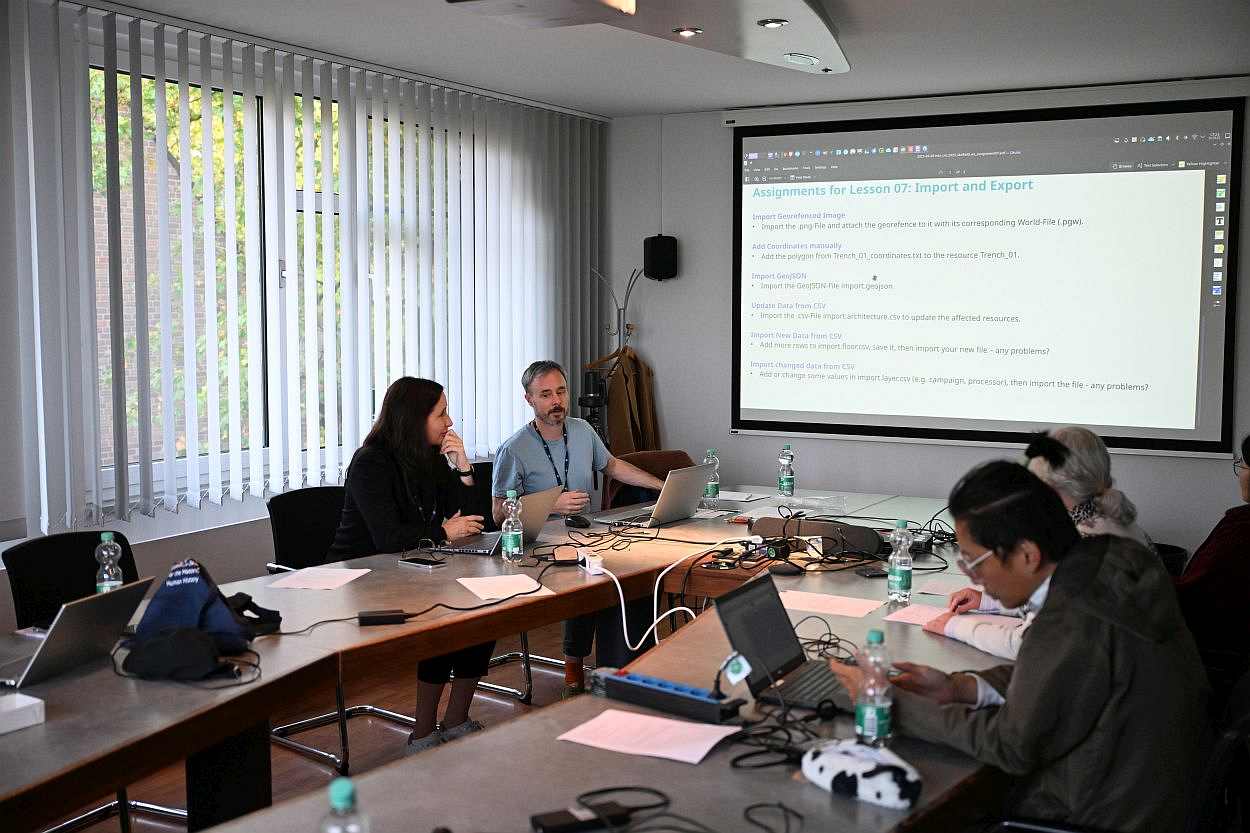
iDAI.field Workshop © Fliegender Fotograf 30.09.2025
Workshop 6 - Make your data fit for subsequent use: long-term archiving in a practical and pragmatic way
In the long-term archiving workshop, Juliane Watson from the German Archaeological Institute explained important aspects that need to be considered when archiving your own research data for the long term. Specific strategies for different types of data and their implementation were presented. The LTA counselling session, which takes place once a month, can also be used afterwards to answer more specific questions from participants.
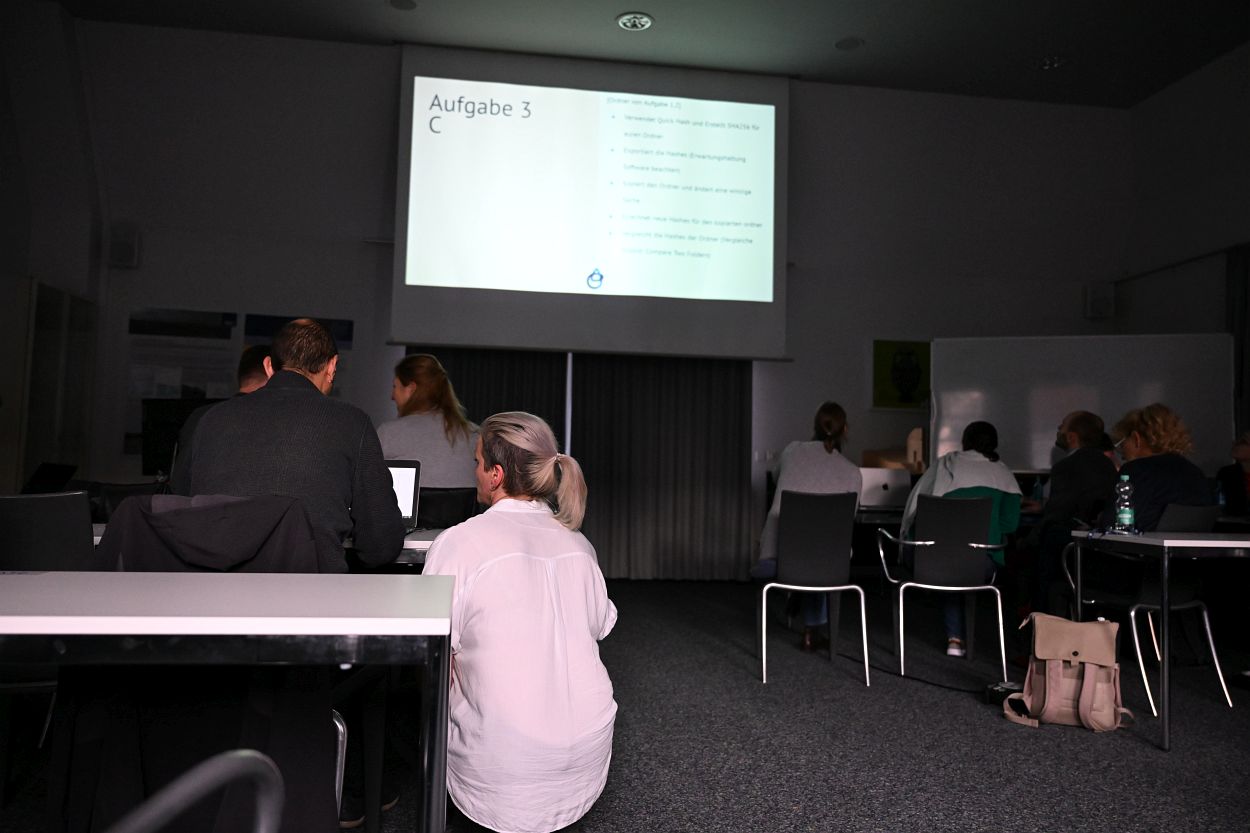
Task processing workshop long-term archiving © Fliegender Fotograf 30.09.2025
Icebreaker
After the workshops, the Icebreaker took place in the ‘Black Diamond’ and offered the first opportunity for networking. A relaxed atmosphere and stimulating discussions ensured a pleasant end to the first day of the conference.
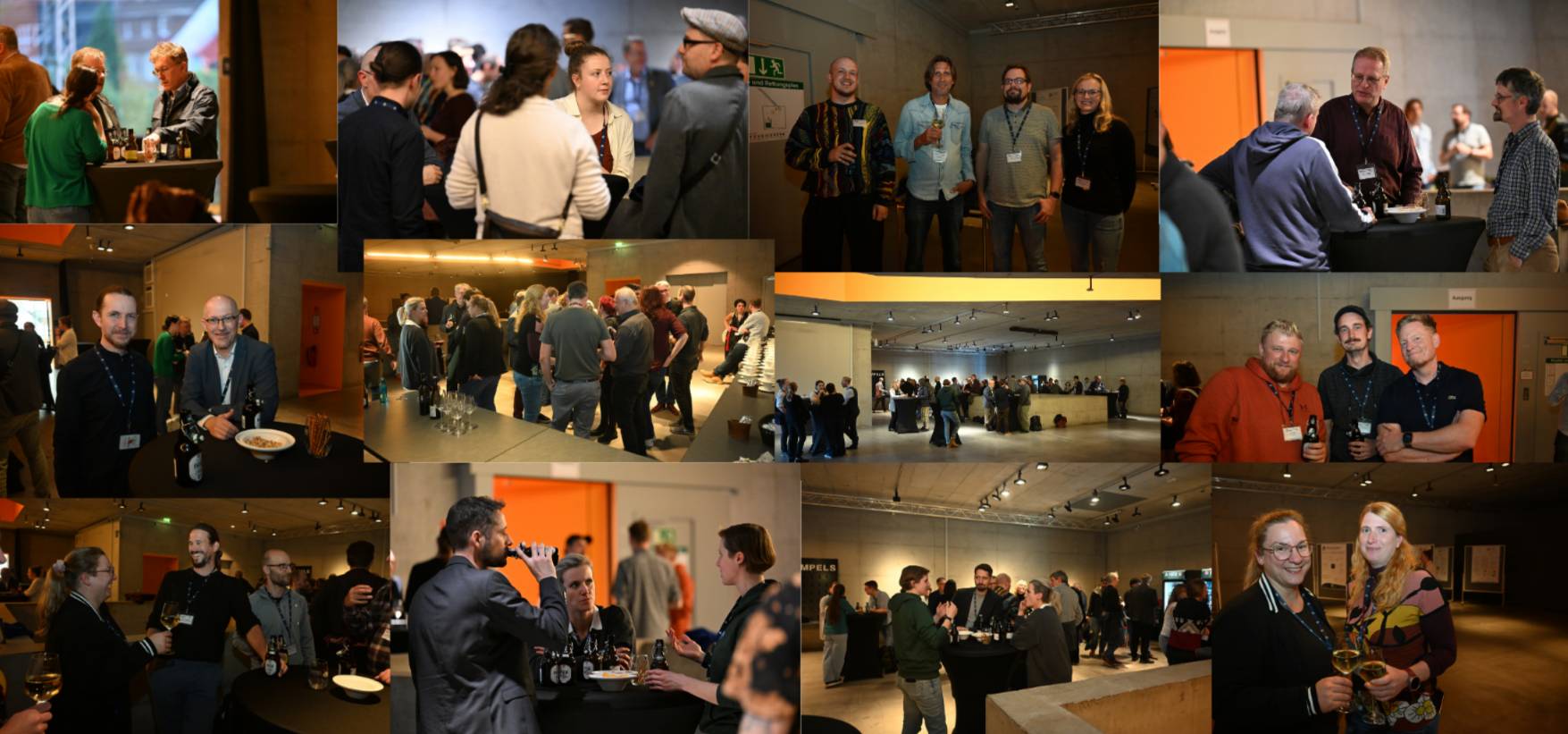
Icebreaker © Collage Fliegender Fotograf 30.09.2025
Day 2 - Wednesday, 01.10.2025
The second day of the conference began with a welcome address by the Scientific Director of the German Mining Museum, Prof Dr Sundhild Kleingärtner.
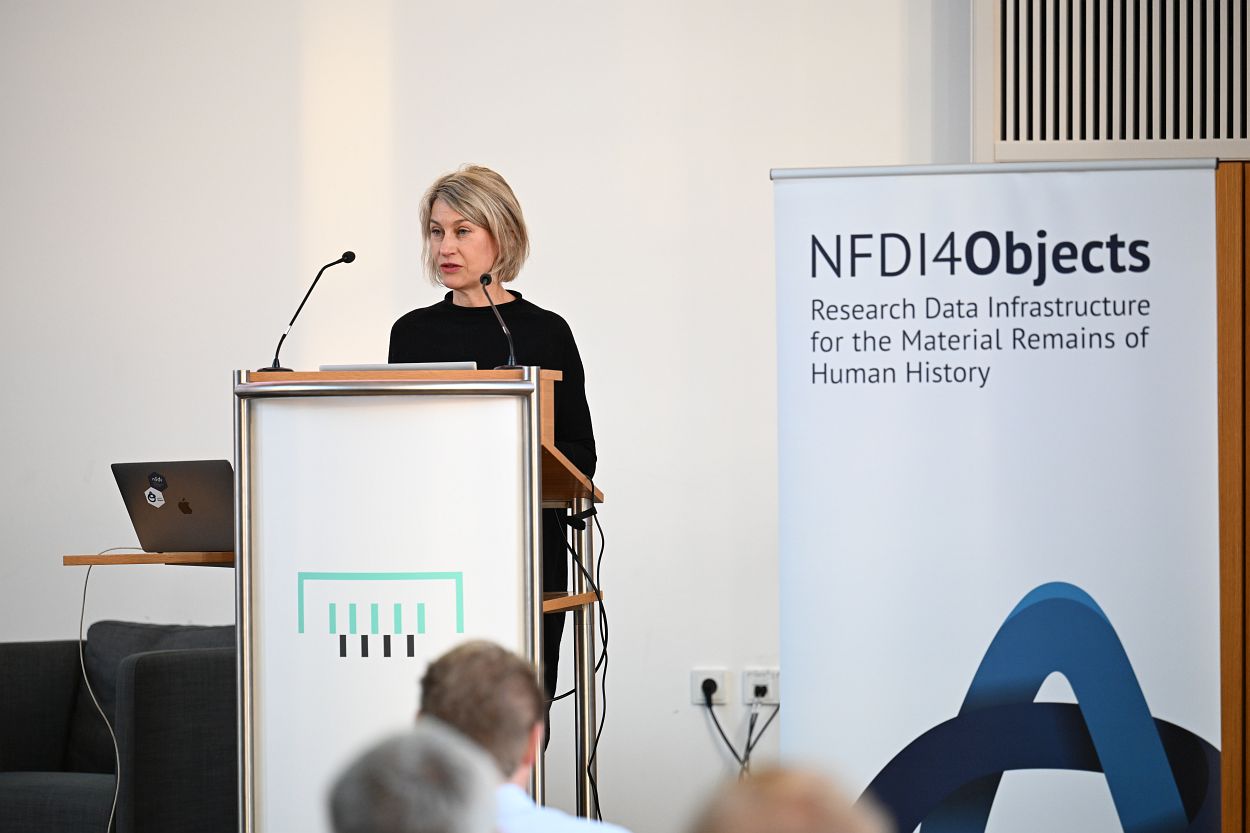
Prof. Dr. Sundhild Kleingärtner © Fliegender Fotograf 01.10.2025
Ina Brandes, the State Minister for Culture and Science of North Rhine-Westphalia, gave the participants a warm welcome at the opening of the event in video format.
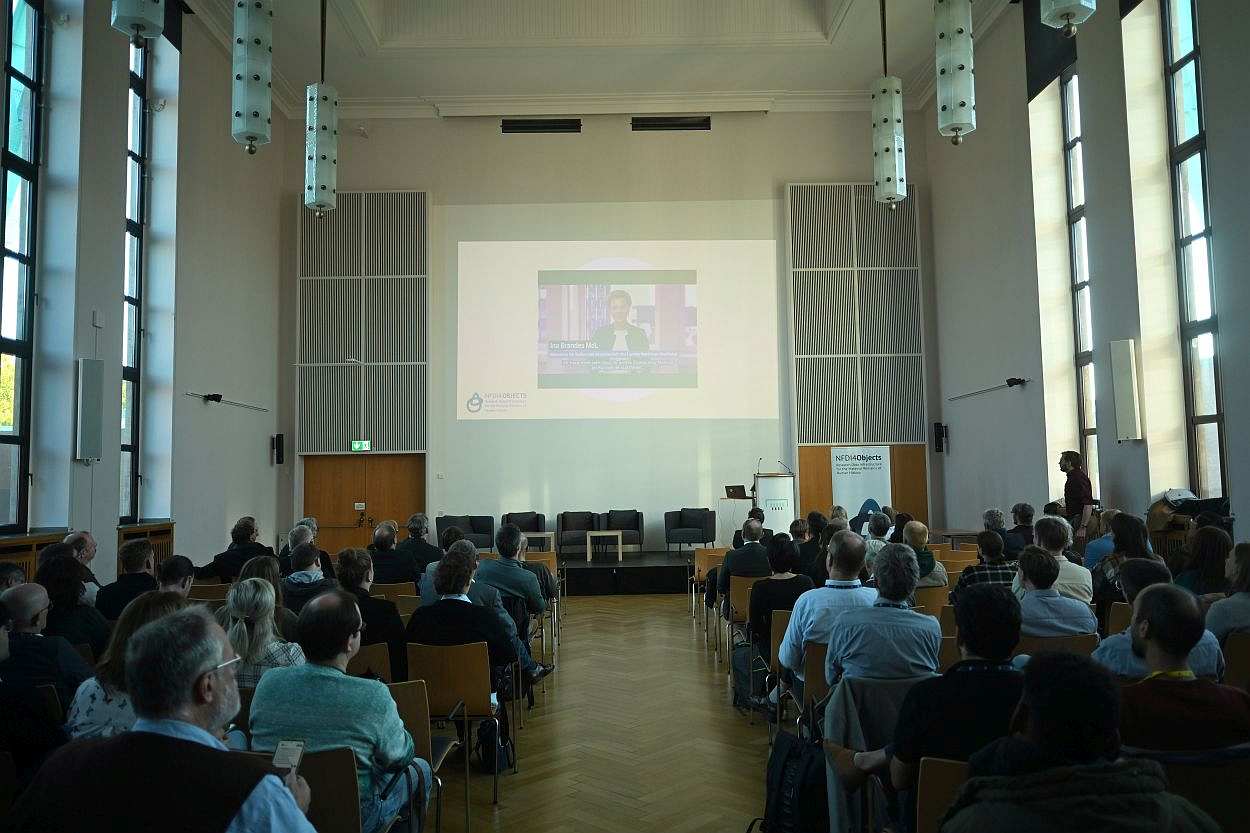
Video message by Ina Brandes (MdL) © Fliegender Fotograf 01.10.2025
Philipp von Rummel from the German Archaeological Institute and spokesperson for the consortium then began with a review of the first funding phase. Both challenges and achievements were presented.
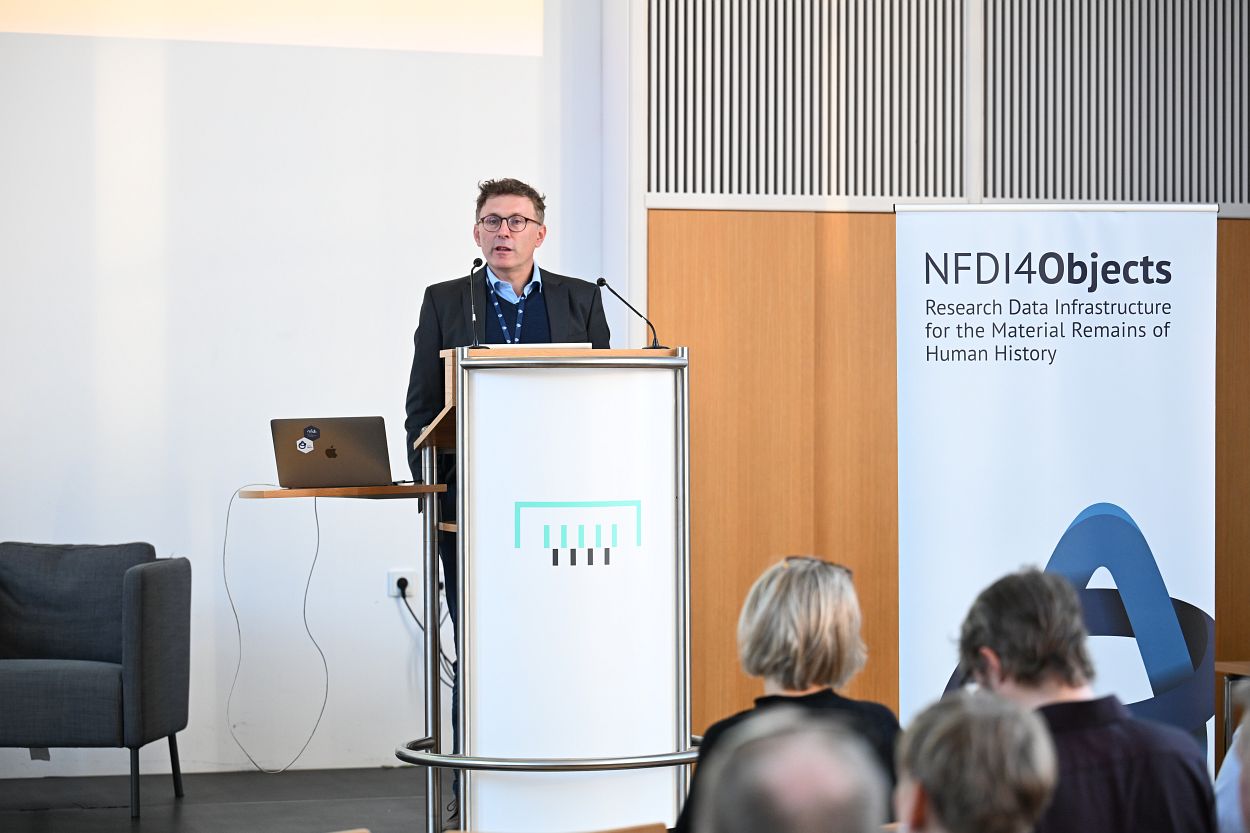
The speaker of our consortium Philipp von Rummel © Fliegender Fotograf 01.10.2025
After a refreshing coffee break, the Ignite Talks took place. Data (horror) stories were presented in an entertaining way by Fabian Fricke and Lennart Linde as well as Stefan Buddenbohm from Konsortium Text+, Anja Gerber from Klassik Stiftung Weimar and Lasse Mempel-Länger from LEIZA. The Ignite Talks stimulated intensive discussions with the audience.
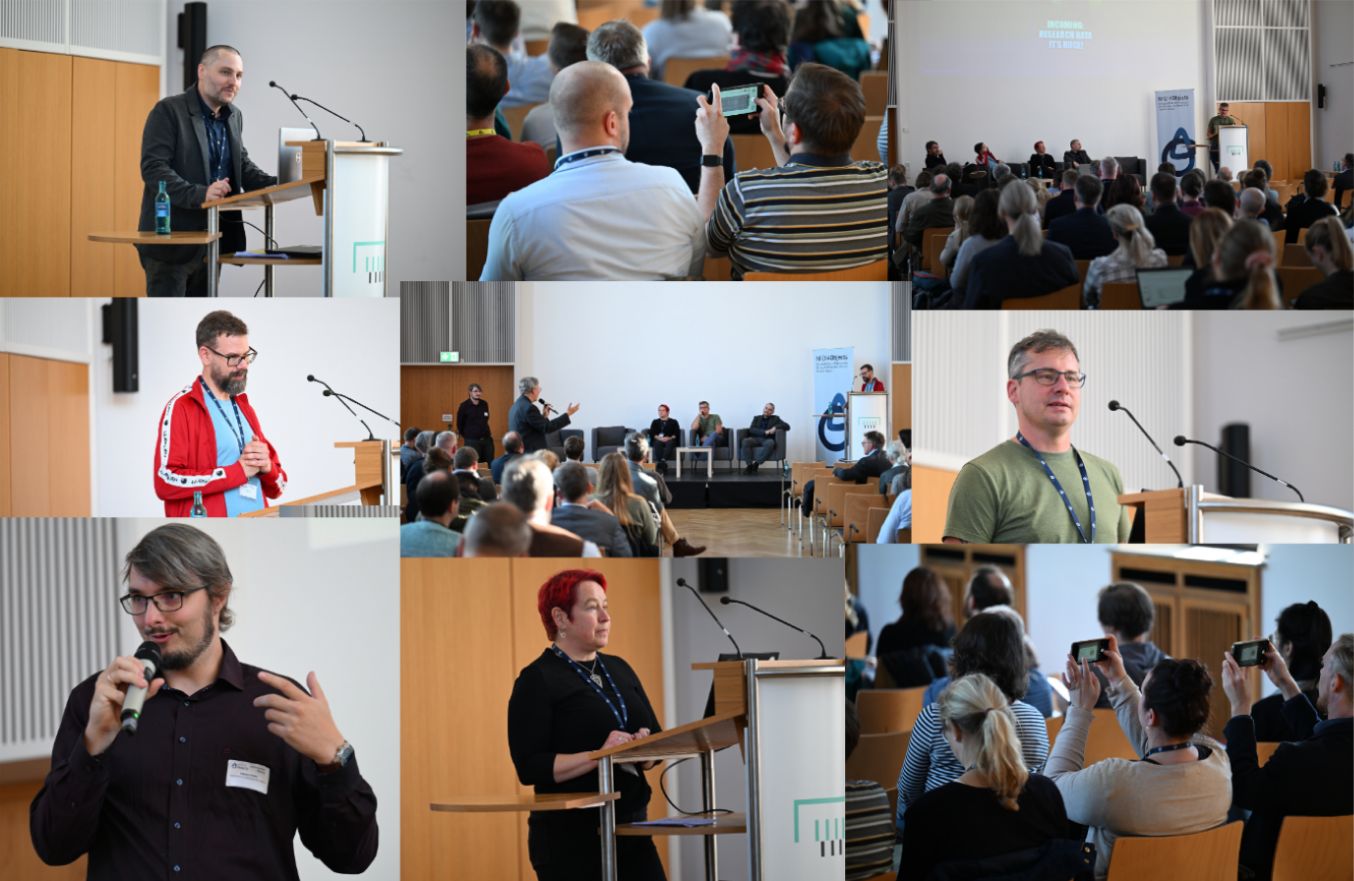
Ignite Talks © Collage Fliegender Fotograf 01.10.2025
Philipp von Rummel opened the programme item ‘NFDI4Objects today: Our services in practical use’ and presented services and success stories from NFDI4Objects. Survey2GIS, the BCDH Toolbox Metashape, the Find Logbook, common metadata standards in the event of loss, Poseidon, the NFDI4Objects Commons Incubator, the Knowledge Graph and others - all services that have been developed by NFDI4Objects to date were presented with their functionality.
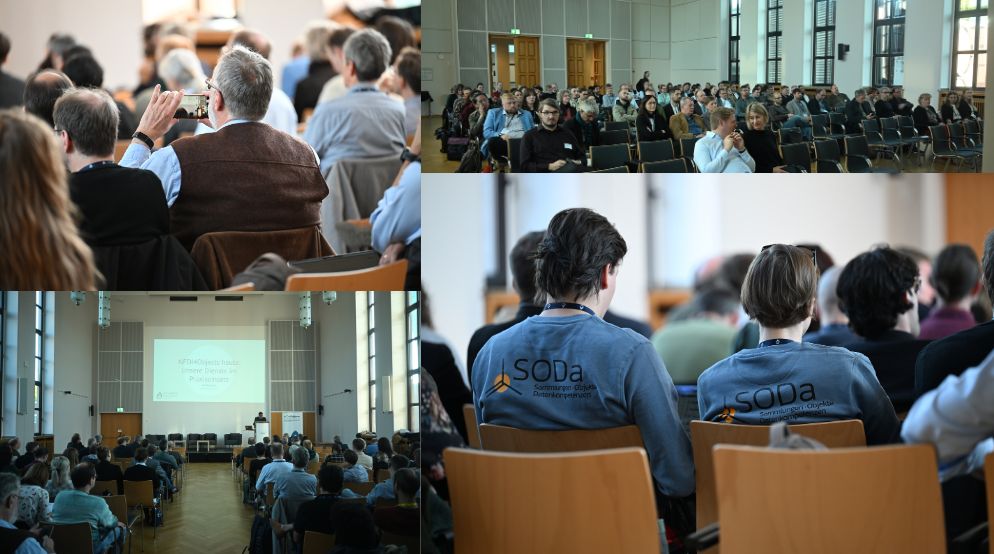
Auditorium © Collage Fliegender Fotograf 01.10.2025
After another short break and intensive dialogue, the Market Place could begin. A total of 38 posters were submitted for this, which took place in the same location as the Icebreaker. Several posters from our own ranks, also for the presentation of the developed services, were on display with posters from the Text+ consortium, the SoDA data competence centre and HERMES. Stimulating discussions developed over the course of the session.
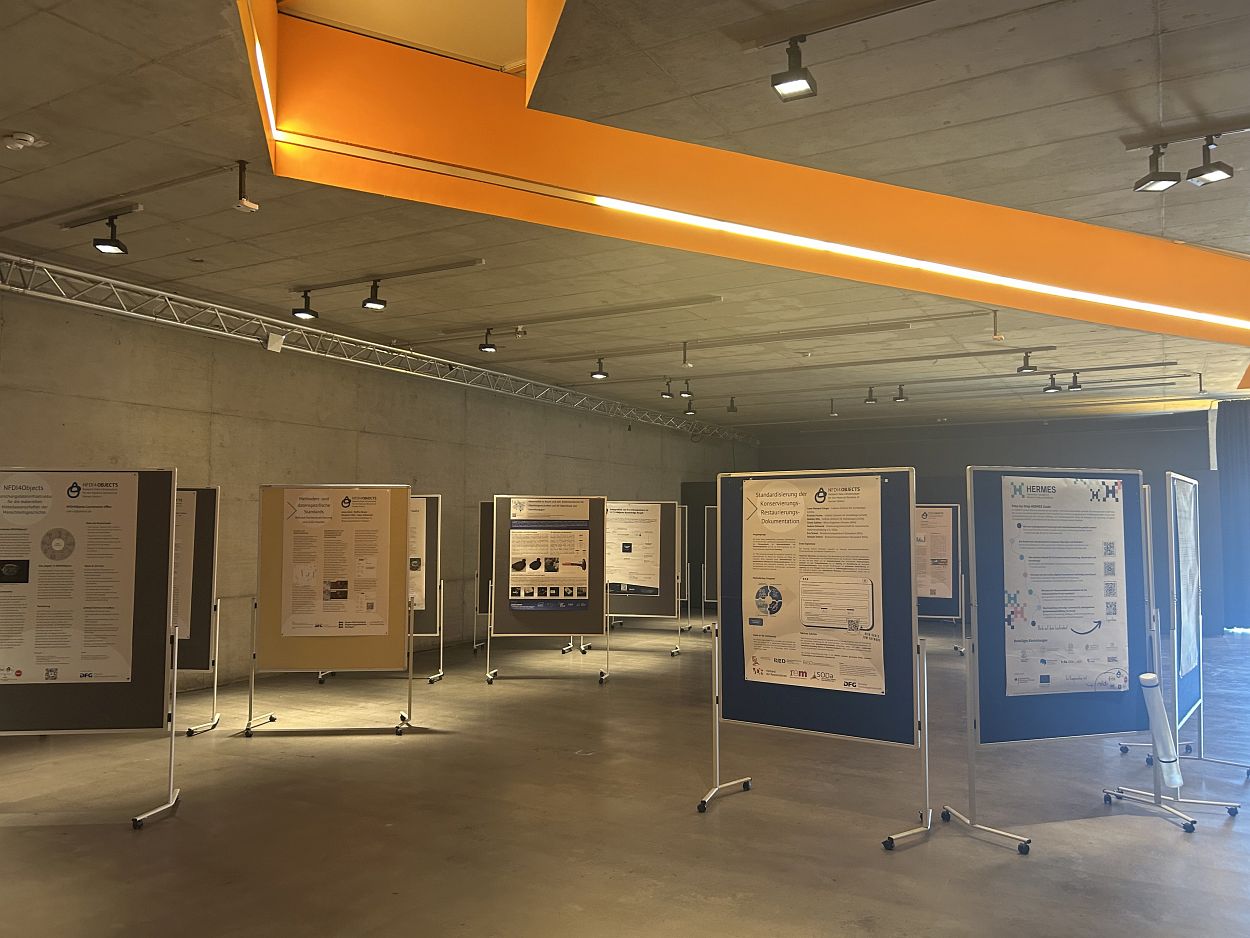
Postersession © Gerda Grimm 01.10.2025
The last fixed item on the programme was the fishbowl discussion. Kai-Christian Bruhn and Alexandra Busch from LEIZA, Christin Keller from the German Archaeological Institute and Holger Simon from the German Mining-Museum took questions and discussion points from the audience, supported by Philipp von Rummel, Gerald Steilen, Florian Thiery, Stephan Schiffels from the Max Planck Institute for Evolutionary Anthropology, Bernhard Weisser from the Prussian Cultural Heritage Foundation and Karsten Lambers from the University of Augsburg. Questions that had already arisen during the course of the day and repeatedly provided food for thought were discussed here.
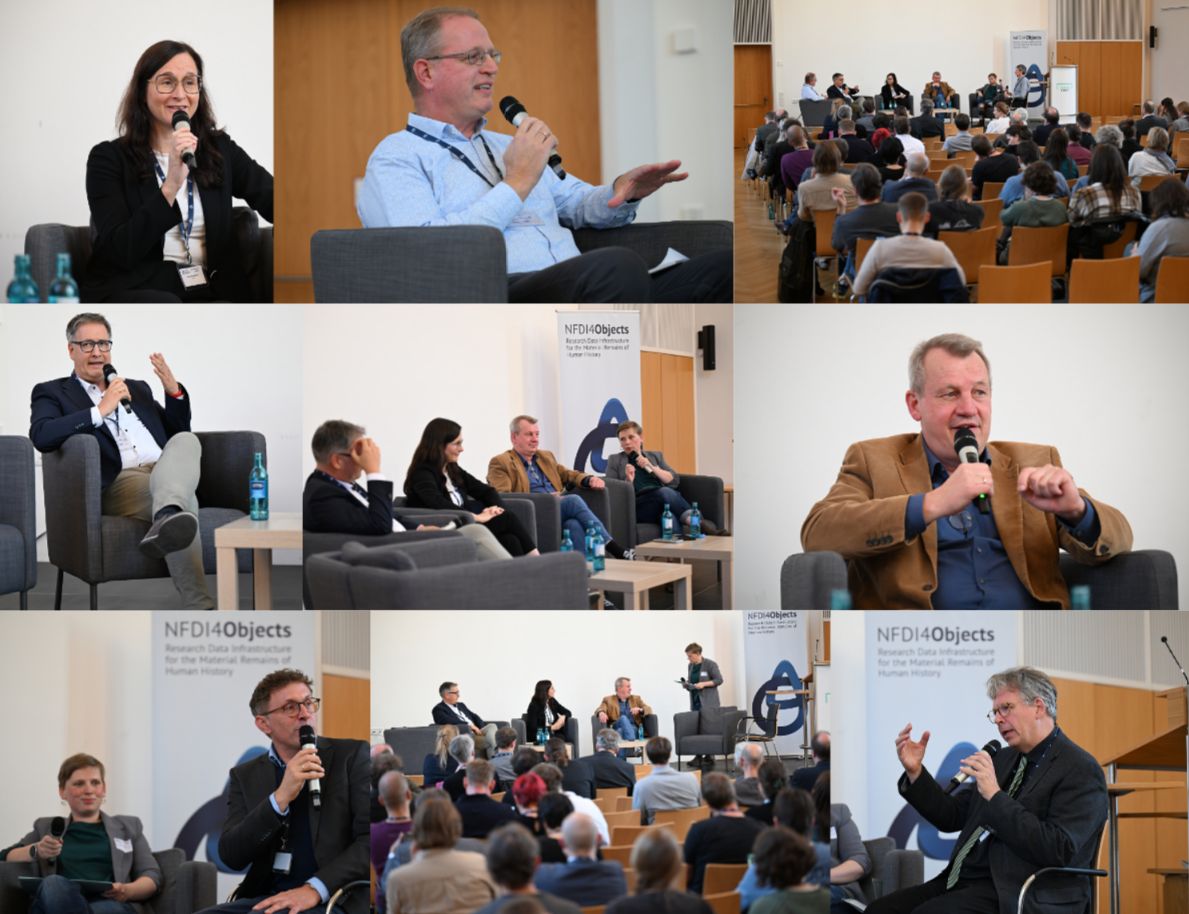
Fishbowl-Discussion © Fliegender Fotograf 01.10.2025
The second day of the conference ended with a meal together in the ‘Kumpels’ restaurant in the German Mining Museum, drinks and other great personal discussions.
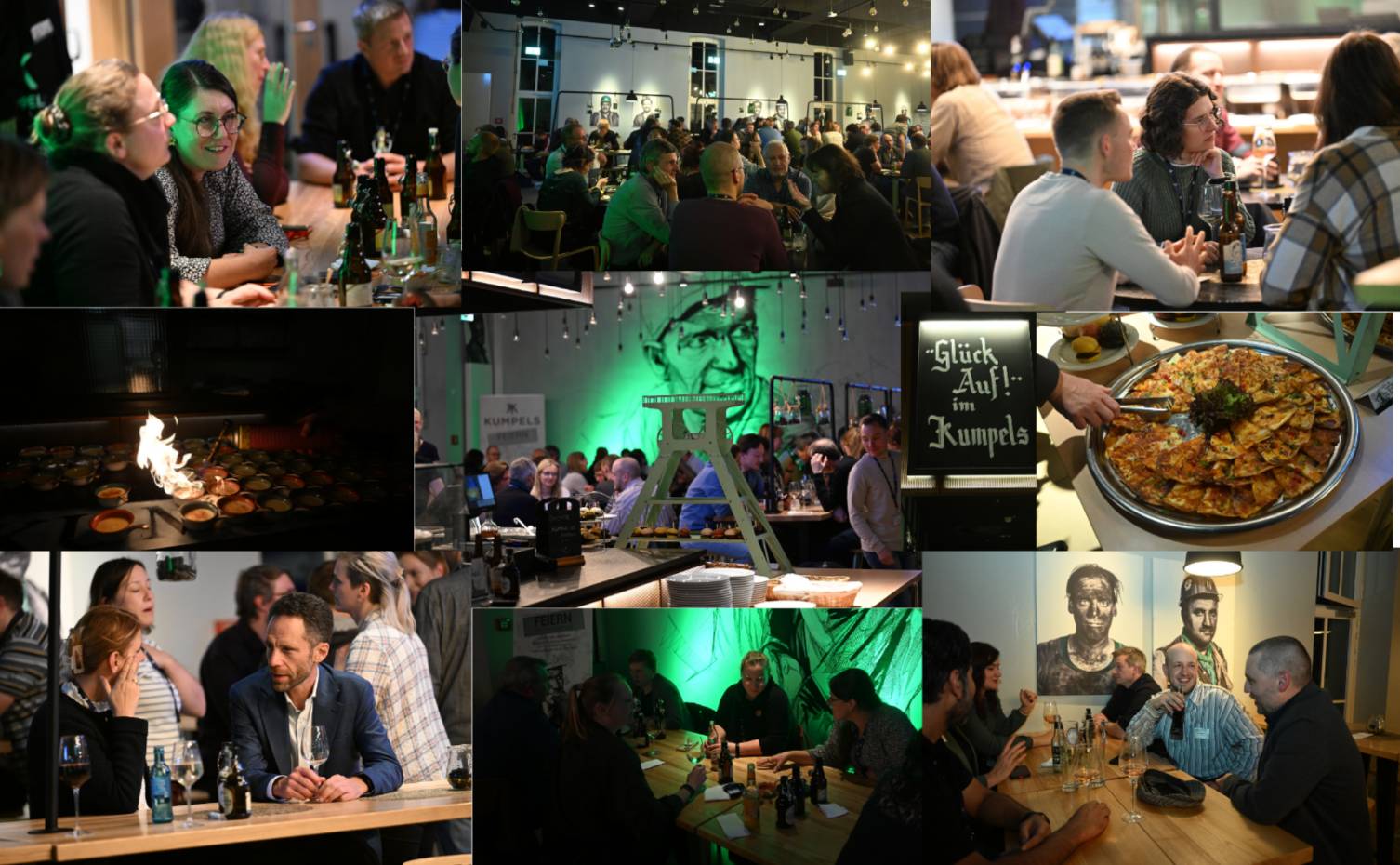
Evening event at the Kumpels-restaurant © Fliegender Fotograf 01.10.2025
Day 3 - Thursday 02.10.2025
The third and final day of the conference began with the General Assembly. At around 9 a.m., the representatives of the consortium’s member organisations gathered to vote on various topics, such as planning for the 2025/26 project year.
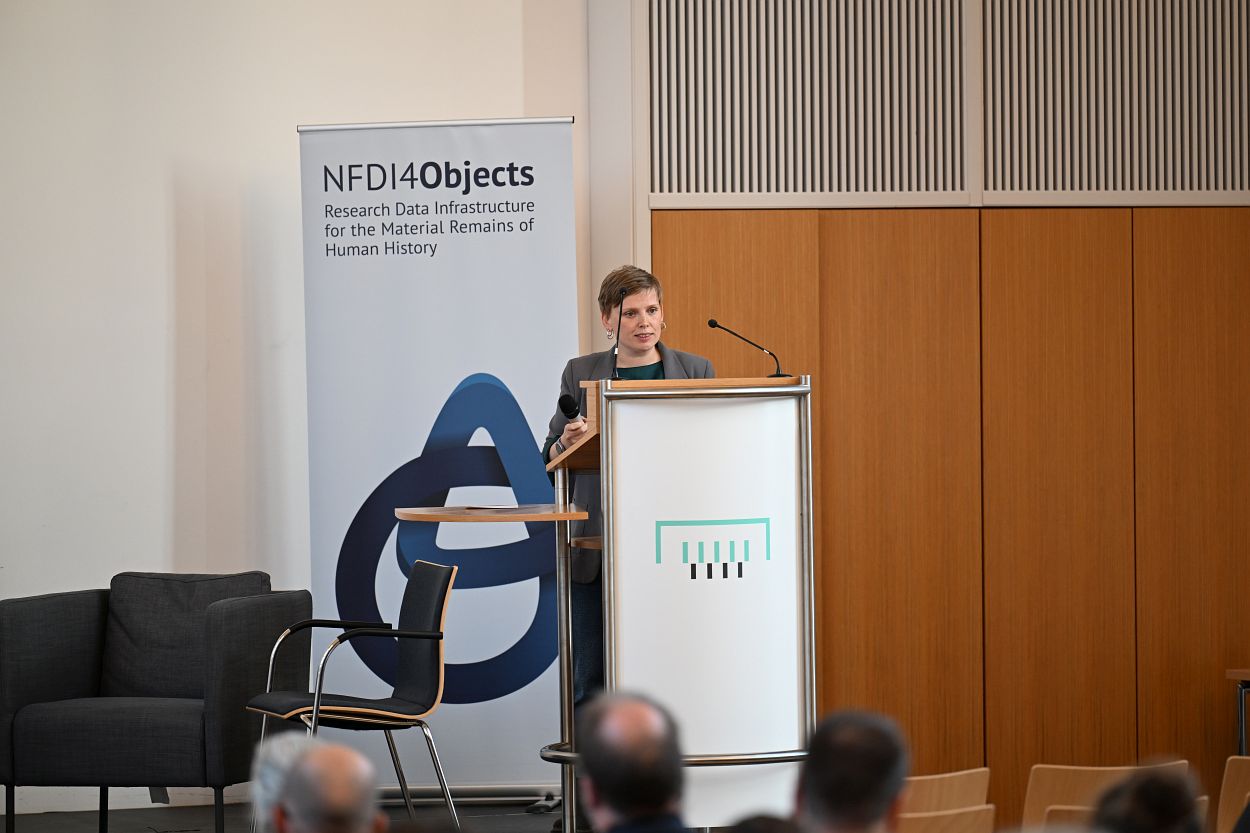
Christin Keller, Managing Director of NFDI4Objects chairs the General Assembly © Fliegender Fotograf 02.10.2025
In the morning, further workshops of the various departments started. The Community Clusters and Temporary Working Groups also had the opportunity to meet in person on the premises of the Mining Museum and the Georg Agricola University of Applied Sciences and discuss the joint work programme.
- Workshop - Knowledge Graph: Data Validation, Enrichment, Import and Analysis, Application
- Workshop - Services for Archaeometry and Geoarchaeology: Establishing a Community Cluster?
Open Forum - Community Cluster & Temporary Working Groups
- CC Planning FDM Consultancy
- CC Planning Qualification and Open Educational Resources (OER)
- CC Experimental Archaeology
- CC Provenance Research
- CC Protected Heritage Sites
- TWG Community recommendations for long-term archiving
- TWG Protected Heritage Sites - Bring your own Data - Event
- TWG 3D Annotation of Meshes with the Web Annotation Data Model
The conference ended at 2 p.m. with a guided tour of the exhibition mine. We would like to thank the host, the German Mining-Museum Bochum, as well as all contributors and participants who contributed to the success of the Community Meeting.
Registration
You can register for the Community Meeting free of charge via this link. The registration deadline for the Community Meeting is 19 September 2025.
We look forward to your participation!
Call for Papers, Posters and registration of meetings of TWGs and CCs
Ignite talks and posters can once again be submitted for the Community Meeting. There will also be an opportunity for face-to-face meetings for Community Clusters (CCs) and Temporary Working Groups (TWGs). Submissions for Ignite Talks and posters can be made until 22 September via the event website. Meetings of CCs and TWGs can be registered until 21 September via the same page.
! Deadline extension for the submission of posters and Ignite Talks until 22 September !
Call for Papers: Ignite Talks on “Data (Horror) Stories”
Share Your Data (Horror) Story! We are seeking captivating Ignite Talks (5 minutes, 20 slides) about your most thrilling, terrifying, or funniest experiences dealing with data. Show us your insights, mistakes, and the lessons learned.
What is an Ignite Talk?
An Ignite Talk is a fast-paced and dynamic presentation format designed to capture the audience’s attention in a short amount of time. The essential characteristics of an Ignite Talk are:
- Time Limit: The presentation lasts exactly 5 minutes.
- Slide Change: 20 slides are used, which automatically advance every 15 seconds.
- Conciseness: Due to the strict time and slide constraints, the speaker must present their content precisely and focused.
- Entertaining: Ignite Talks are often entertaining, stimulating, and to the point, aiming to quickly inform and inspire the audience. This structure forces speakers to formulate their message clearly and succinctly, making the talks particularly memorable. Ignite Talks are ideal for conferences and events where many different topics need to be covered in a short amount of time.
Submission Details:
- Abstract Length: max. 500 words
- Language: German or English
- Abstract Submission Deadline: September 8, 2025
- Notification of Acceptance: September 15, 2025
- Who Can Participate: Everyone from the community. This includes students, doctoral candidates, early career researchers such as post-docs, as well as researchers, lecturers, and members of our Task Areas, Community Clusters, and Temporary Working Groups.
Call for Papers: Poster Session
We provide space for your work on the topics of handling, storing, and managing object-related data, services, and challenges and solutions in the field of research data management. Submissions can be on any topics relevant to the consortium. More information on the NFDI4Objects work program can be found on our website: https://www.nfdi4objects.net/
Submission Details:
- Abstract Length: max. 500 words
- Language: German or English
- Abstract Submission Deadline: September 8, 2025
- Notification of Acceptance: September 15, 2025
- Who Can Participate: Everyone from the community. This includes students, doctoral candidates, early career researchers such as post-docs, as well as researchers, lecturers, and members of our Task Areas, Community Clusters, and Temporary Working Groups.
Registration of Meetings of Temporary Working Groups (TWGs) and Community Clusters (CCs)
In order to plan the Community Meeting as effectively as possible, we kindly request that all TWGs and CCs, who would like to hold an in-person meeting in Bochum, to register this wish by 21 September 2025.
Programme
Please note that there may be changes to the agenda at short notice. These changes will be continuously updated on this page.